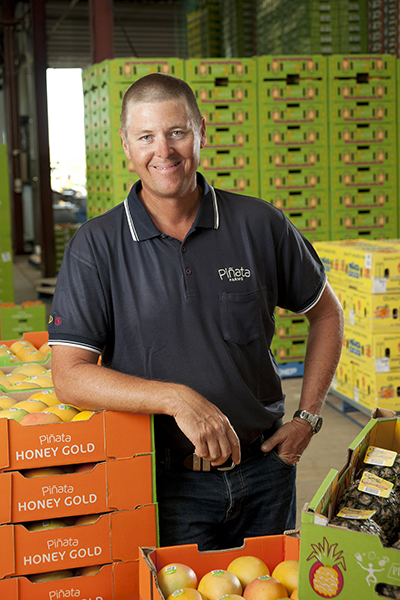Pinata’s mango harvest innovations fruitful
EXTRA >> HONEY GOLD mango producer, Piñata Farms Pty Ltd, has launched the Australian mango industry’s first custom-made harvesting aids and introduced night picking at its Northern Territory farms.
Piñata Farms managing director, Gavin Scurr, said three bespoke harvesting aids, designed to maintain fruit quality and prolong shelf life, were operating at its Katherine and Mataranka farms for the first time this season. 
The aids, which cost $190,000 each to manufacture, were built to Piñata Farms’ specifications by Lockyer Valley-based agricultural engineering firm, Starkbilt. Trialled last season, they were all in operation in the Northern Territory this season.
“The objective was to design an aid that is gentler on fruit by reducing the number of times it is handled, resulting in better-looking fruit and better shelf life,” Mr Scurr said.
Each aid requires a picking crew of eight to 10 to operate, including a driver. The double-sided aids work through the rows, with harvesters picking fruit from both sides.
“All fruit is now picked off the tree by hand and placed on an elevator built into the aid. This carries the fruit to a water bath to wash off the highly acidic sap that mangoes produce,” Mr Scurr said.
“Fruit then travels on another elevator to be rinsed and is deposited gently into bins which, when full, are transported by forklift to the packing shed.
“Traditionally mangoes are picked by hand, bounced into a trampoline and washed and rinsed by hand. With these new aids, fruit is only touched once by hand, resulting in less bruising.
“We've also introduced night picking for the first time at our Northern Territory farms. This is both kinder to the picking crew and the fruit which is less fragile in the cool and retains freshness for longer.”
Mr Scurr said three quarters of this year’s Northern Territory harvest would be conducted at night, moving to 100 percent night harvesting next season.
Northern Territory Honey Golds are harvested seven days a week from 10pm to 7am when the average temperature is 26 degrees celsius – a far cry from the average daily temperature which can exceed 50 degrees.
“Between the new aids and night harvesting, we expect to achieve a 20 percent increase in efficiencies this season. We are now picking a bin of fruit every eight minutes on each machine.”
Mr Scurr said the new aids would only be used in the Top End for now with older aids relocated to farms in Queensland. Piñata Farms’ most remote orchards are spread over a vast 80 hectares.
Mr Scurr said this season’s Katherine harvest ended in mid-December. Picking began at Mataranka in late November and the Queensland Honey Gold harvest began in North Queensland on December 15. Queensland produces about 60 percent of the total crop – although on smaller farms.
Piñata Farms has 140,000 trees on 500 hectares under cultivation. Honey Gold mangoes are grown exclusively by Piñata Farms and 36 contracted growers in five mainland states.
Piñata Farms is a Queensland family business with origins dating back to the 1960s in the state’s south-east. Founded by pineapple farmer Geoff Scurr at Wamuran, Piñata Farms is now operated by his sons, Gavin and Stephen Scurr.
Piñata Farms is the largest pineapple producer in Australia, one of the largest strawberry producers and holds the breeding rights to grow specialty Honey Gold mangoes, produced in every mainland state except South Australia.
Honey Gold growing regions are Katherine and Mataranka, Northern Territory; Giru, Bowen, Dimbulah, Mutchilba, Rockhampton, Yarwun, Benaraby, Bundaberg, Wamuran and Gatton, Queensland; Byron Bay and Coffs Harbour, New South Wales; Robinvale and Mildura, Victoria; Kununurra and Carnarvon, Western Australia.
ends

 How to resolve AdBlock issue?
How to resolve AdBlock issue?